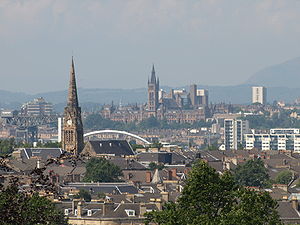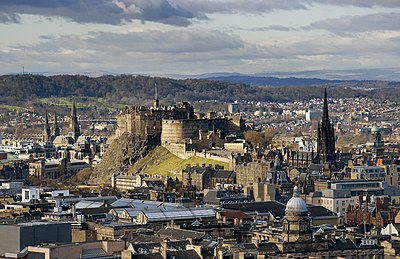Portal:Scotland
| Main Page | Selected articles 1 | Selected articles 2 | Selected biographies | Selected quotes | Selected pictures | Featured Content | Categories & Topics |
Introduction
 |

|
|

| ||
Scotland (Scots: Scotland; Scottish Gaelic: Alba) is a country that is part of the United Kingdom. It contains nearly one-third of the United Kingdom's land area, consisting of the northern part of the island of Great Britain and more than 790 adjacent islands, principally in the archipelagos of the Hebrides and the Northern Isles. To the south-east, Scotland has its only land border, which is 96 miles (154 km) long and shared with England; the country is surrounded by the Atlantic Ocean to the north and west, the North Sea to the north-east and east, and the Irish Sea to the south. The population in 2022 was 5,436,600 and accounts for 8% of the population of the UK. Edinburgh is the capital and Glasgow is the largest of the cities of Scotland.
The Kingdom of Scotland emerged in the 9th century. In 1603, James VI inherited England and Ireland, forming a personal union of the three kingdoms. On 1 May 1707 Scotland and England combined to create the new Kingdom of Great Britain, with the Parliament of Scotland subsumed into the Parliament of Great Britain. In 1999 a Scottish Parliament was re-established, and has devolved authority over many areas of domestic policy. The country has a distinct legal system, educational system, and religious history from the rest of the UK, which have all contributed to the continuation of Scottish culture and national identity. Scottish English and Scots are the most widely spoken languages in the country, existing on a dialect continuum with each other. Scottish Gaelic speakers can be found all over Scotland, however the language is largely spoken natively by communities within the Hebrides. The number of Gaelic speakers numbers less than 2% of the total population, though state-sponsored revitalisation attempts have led to a growing community of second language speakers.
The mainland of Scotland is broadly divided into three regions: the Highlands, a mountainous region in the north and north-west; the Lowlands, a flatter plain across the centre of the country; and the Southern Uplands, a hilly region along the southern border. The Highlands are the most mountainous region of the British Isles and contain its highest peak, Ben Nevis, at 4,413 feet (1,345 m). The region also contains many lakes, called lochs; the term is also applied to the many saltwater inlets along the country's deeply indented western coastline. The geography of the many islands is varied. Some, such as Mull and Skye, are noted for their mountainous terrain, while the likes of Tiree and Coll are much flatter. (Full article...)
Selected article

Glasgow (UK: /ˈɡlɑːzɡoʊ, ˈɡlæz-, ˈɡlɑːs-, ˈɡlæs-/ GLA(H)Z-goh, GLA(H)SS-; Scots: Glesca [ˈɡleskə] or Glesga [ˈɡlezɡə]; Scottish Gaelic: Glaschu [ˈkl̪ˠas̪əxu]) is the most populous city in Scotland, the third-most populous city in the United Kingdom, and the 27th-most populous city in Europe. In 2022, it had an estimated population as a defined locality of 632,350 and anchored an urban settlement of 1,028,220. Glasgow became a county in 1893, the city having previously been in the historic county of Lanarkshire, and later growing to also include settlements that were once part of Renfrewshire and Dunbartonshire. It now forms the Glasgow City Council area, one of the 32 council areas of Scotland, and is administered by Glasgow City Council.
The city is a member of the Core Cities Group, having the largest economy in Scotland and the third-highest GDP per capita of any city in the UK. Glasgow's major cultural institutions enjoy international reputations including The Royal Conservatoire of Scotland, Burrell Collection, Kelvingrove Art Gallery and Museum, Royal Scottish National Orchestra, BBC Scottish Symphony Orchestra, Scottish Ballet and Scottish Opera. The city was the European Capital of Culture in 1990 and is notable for its architecture, culture, media, music scene, sports clubs and transport connections. It is the fifth-most visited city in the United Kingdom. The city hosted the 2021 United Nations Climate Change Conference (COP26) at its main events venue, the SEC Centre. Glasgow hosted the 2014 Commonwealth Games and the first European Championships in 2018, was one of the host cities for UEFA Euro 2020, and will be a host city of the UEFA Euro 2028. The city is also well known in the sporting world for football, particularly for the Old Firm rivalry.
Glasgow grew from a small rural settlement close to Glasgow Cathedral and descending to the River Clyde to become the largest seaport in Scotland, and tenth largest by tonnage in Britain. Expanding from the medieval bishopric and episcopal burgh (subsequently royal burgh), and the later establishment of the University of Glasgow in the 15th century, it became a major centre of the Scottish Enlightenment in the 18th century. From the 18th century onwards, the city also grew as one of Britain's main hubs of oceanic trade with North America and the West Indies; soon followed by the Orient, India, and China. With the onset of the Industrial Revolution, the population and economy of Glasgow and the surrounding region expanded rapidly to become one of the world's pre-eminent centres of chemicals, textiles and engineering; most notably in the shipbuilding and marine engineering industry, which produced many innovative and famous vessels. Glasgow was the "Second City of the British Empire" for much of the Victorian and Edwardian eras.
Selected quotes
" ... Whaur's yer Wullie Shakespeare noo? ... "
—Anonymous
(Patriotic shout from an audience member at the 1st Edinburgh performance of the John Home tragedy Douglas)
" ... Law is the reflection of the spirit of a people, and so long as the Scots are conscious that they are a people, they must preserve their law ... "
In the news

- 25 April 2024 – Premiership of Humza Yousaf
- The Scottish National Party's coalition in the Scottish government with the Scottish Greens collapses as the Scottish National Party withdraws, although the party announces its intention to continue as a minority government. In response, the Scottish Conservatives call a no confidence vote against First Minister Humza Yousaf. (Reuters) (BBC News)
Selected biography

Anne (6 February 1665 – 1 August 1714) was Queen of Great Britain and Ireland following the ratification of the Acts of Union on 1 May 1707, which merged the kingdoms of Scotland and England. Before this, she was Queen of England, Scotland, and Ireland from 8 March 1702.
Anne was born during the reign of her uncle King Charles II. Her father was Charles's younger brother and heir presumptive, James, whose suspected Roman Catholicism was unpopular in England. On Charles's instructions, Anne and her elder sister Mary were raised as Anglicans. Mary married their Dutch Protestant cousin, William III of Orange, in 1677, and Anne married the Lutheran Prince George of Denmark in 1683. On Charles's death in 1685, James succeeded to the throne, but just three years later he was deposed in the Glorious Revolution of 1688. Mary and William became joint monarchs. Although the sisters had been close, disagreements over Anne's finances, status, and choice of acquaintances arose shortly after Mary's accession and they became estranged. William and Mary had no children. After Mary's death in 1694, William reigned alone until his own death in 1702, when Anne succeeded him.
Selected picture
Edinburgh Castle is a fortress which dominates the skyline of the city of Edinburgh, from its position atop the volcanic Castle Rock. Human habitation of the site is dated back as far as the 9th century BC, although the nature of early settlement is unclear. There has been a royal castle here since at least the reign of King David in the 12th century, and the site continued to be a royal residence until the Union of the Crowns in 1603.
Photo credit: Saffron_Blaze
Did You Know...

- ... that the Scottish medical missionary Ernest Muir championed the use of the traditional Ayurvedic cure chaulmoogra oil in treating Hansen's disease (leprosy)?
- ... that after the Battle of Winwick in 1648 some Scottish prisoners were sold as slaves?
- ... that Grey Gowrie, while holding office under Margaret Thatcher, described himself as "Irishman with a Scots name and a German wife, working, somewhat to his surprise, for a very English government"?
- ... that Julia Dawson's first Clarion Van was named for Scottish socialist Caroline Martyn?
- ... that the Aesculapian Club, founded in Edinburgh in 1773, still meets twice a year?
- ... that of the 16 teams to enter the inaugural Scottish Cup, only Dumbarton, Kilmarnock and Queen's Park still regularly compete in the competition?
- ... that the 1929 Scottish Prayer Book is the Scottish Episcopal Church's current version of the Book of Common Prayer?
- ... that mountaineer and geographer Caleb George Cash was instrumental in preserving essential documents pertaining to the first known atlas of Scotland?
Get involved
For editor resources and to collaborate with other editors on improving Wikipedia's Scotland-related articles, see WikiProject Scotland.
To get involved in helping to improve Wikipedia's Scotland related content, please consider doing some of the following tasks or joining one or more of the associated Wikiprojects:
- Visit the Scottish Wikipedians' notice board and help to write new Scotland-related articles, and expand and improve existing ones.
- Visit Wikipedia:WikiProject Scotland/Assessment, and help out by assessing unrated Scottish articles.
- Add the Project Banner to Scottish articles around Wikipedia.
- Participate in WikiProject Scotland's Peer Review, including responding to PR requests and nominating Scottish articles.
- Help nominate and select new content for the Scotland portal.
Do you have a question about The Scotland Portal that you can't find the answer to?
Post a question on the Talk Page or consider asking it at the Wikipedia reference desk.
Related portals
Other language versions
Associated Wikimedia
The following Wikimedia Foundation sister projects provide more on this subject:
-
Commons
Free media repository -
Wikibooks
Free textbooks and manuals -
Wikidata
Free knowledge base -
Wikinews
Free-content news -
Wikiquote
Collection of quotations -
Wikisource
Free-content library -
Wikispecies
Directory of species -
Wikiversity
Free learning tools -
Wikivoyage
Free travel guide -
Wiktionary
Dictionary and thesaurus







































